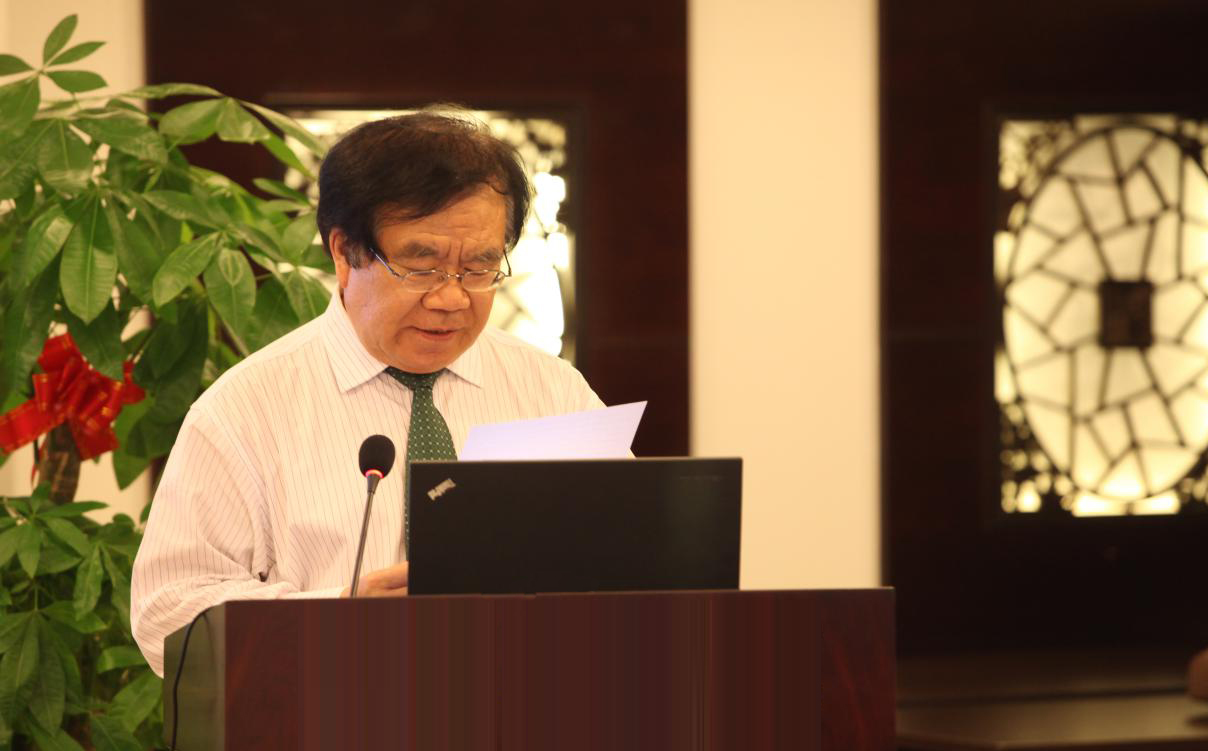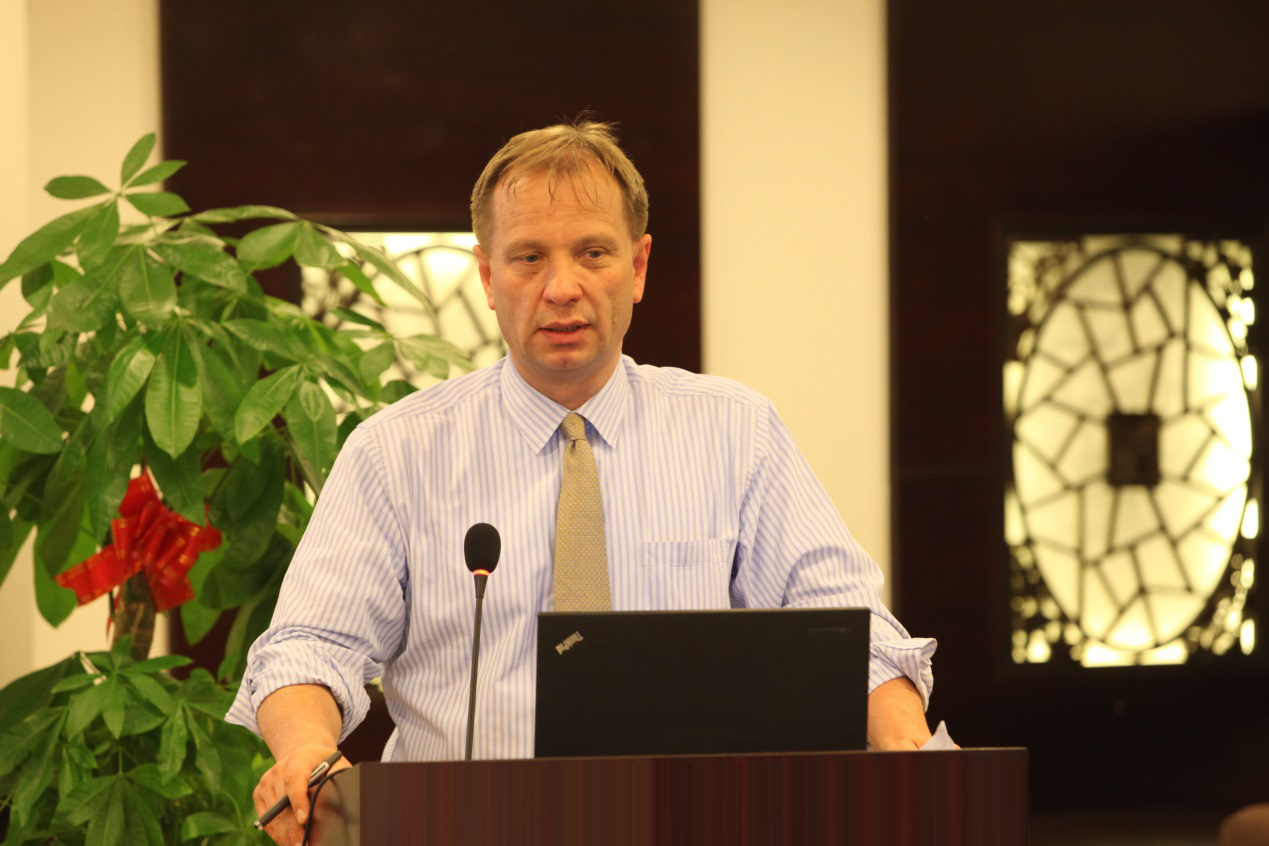RUC hosts the Press Conference of IMF World Economic Outlook 2016
2016-04-15 IMI
Zhang Zhixiang
WEI Benhua and Alfred Schipke opened the floor, with WEI offering an overview of the present global economic situation as well as his views on the Chinese development. He underscored the importance of the WEO for the international exchange of ideas on global economic issues and noted that although worldwide economic recovery continues, the pace of recovery is relatively slow. The Chinese economy is presently in a transitional phase: with emphasis on the New Normal, environmental protection, green economy, inclusive growth, and improving social welfare, economic growth has somewhat slowed down. WEI called on the international community to reaffirm its confidence in China, strengthen international cooperation, and decisively pursue policy measures that promote global economic development.
WEI Benhua
In his remarks, Alfred Schipke discussed decelerated global economic growth, highlighting the vast disparities between countries. However, as developing markets gradually recover, worldwide economic growth will pick up again. Schipke suggested that China's economy slows down because it is shifting to a more environment-friendly and balanced growth model. He suggested that developed economies further pursue structural reforms and give proper weight to fiscal policy. At the same time, developing countries should adopt more flexible monetary and exchange rate policies, and improve supervision in the financial sector.
Alfred Schipke
Raphael Lam delivered a keynote speech entitled Chinese Economy Outlook. He analyzed China’s GDP growth rate statistics, overcapacity and the adjustment, and inequality in growth. He held that China has flexible monetary policy and accelerating credit growth, but fundamentals of corporate finance still remain weak; fiscal deficit and budget deficit are moderate, but deficits in a broad sense are still great; consumption has grown, but at a moderate pace; exchange rate is generally stable, but faces unstable external environment. He pointed out that, policies in the 13th Five-Year Plan are aimed at more environment-friendly, inclusive and sustainable development. We need to strike a balance between slowdown and reform, identify the proper goal, remove loopholes in financial leverage, step up the reform, strengthen exchanges and communication, and thus formulate more effective microeconomic policy.
Raphael Lam
In his keynote speech Analysis of Capital Flow Slowdown in Developing Countries, Lian Weicheng talked about the reasons why capital inflow to emerging market economies has decreased, made comparisons with historical reasons, and explained the driving force for capital inflow. In his view, this round of net capital inflow slowdown has influenced most countries, both in terms of a lower inflow and a higher outflow; currencies in emerging market economies have depreciated against the U.S. dollar; and financing cost is lower than the previous peak but has seen a slight increase recently. He held that capital inflow has decreased mainly because emerging market economies slow down more than advanced economies; and that a more flexible exchange rate has weakened the global environment’s impact on capital flow. He stressed that, a more flexible exchange rate policy and more prudential fiscal policies should be adopted to reduce currency mismatch.
Lian Weicheng
The Economic Counsellor of Turkey Embassy in Beijing, Abdurrahman Ozlen Savkar, the Financial Counsellor of Italian Embassy in Beijing and Bank of Italy Beijing Office, Lorenzo Bencivelli, IMI researcher, and the financial counsellor of German Embassy in Beijing, Robert Elsen, the economic and financial counsellor of German Embassy in Beijng, and The Deutsche Bundesbank Beijing Office, Thomas Notheis, First Secretary of the Brazilian Embassy in Beijing, Augusto Castro, Project Officer of German Corporation for International Cooperation, and Sino-German Center of Finance and Economics, Qi Lan, Secretary of the Board of Directors in Shenhua Group Corporation Limited, Huang Qing, etc. have also attended the conference and shared their views. Attendees shared their views on structural reforms, the internationalization of renminbi, the exchange rate system and so on.
The Conference
The World Economic Outlook is written by IMF researchers. It is an economic survey focused on the analysis of the global macroeconomic trends and economic forecasts and is published twice a year. Renmin University of China’s International Monetary Research Institute (IMI) has been a longstanding partner of the International Monetary Fund, having closely collaborated with the IMF in creating a platform for in-depth analysis and exchange on global economic development.